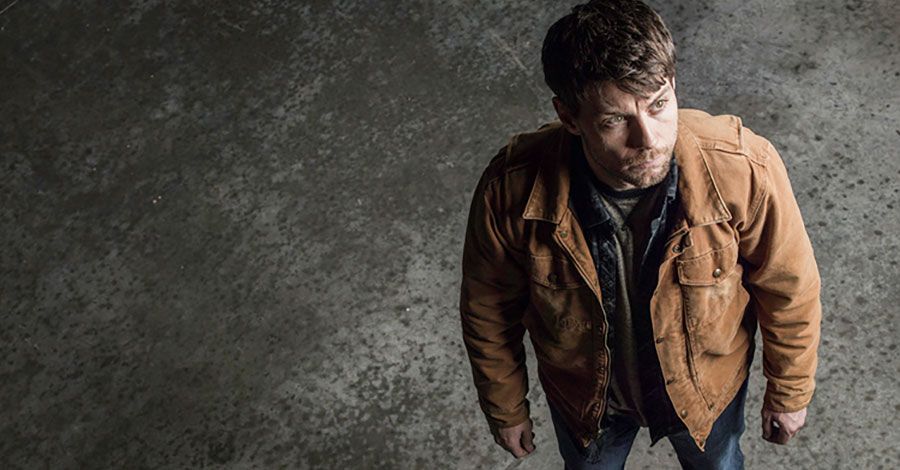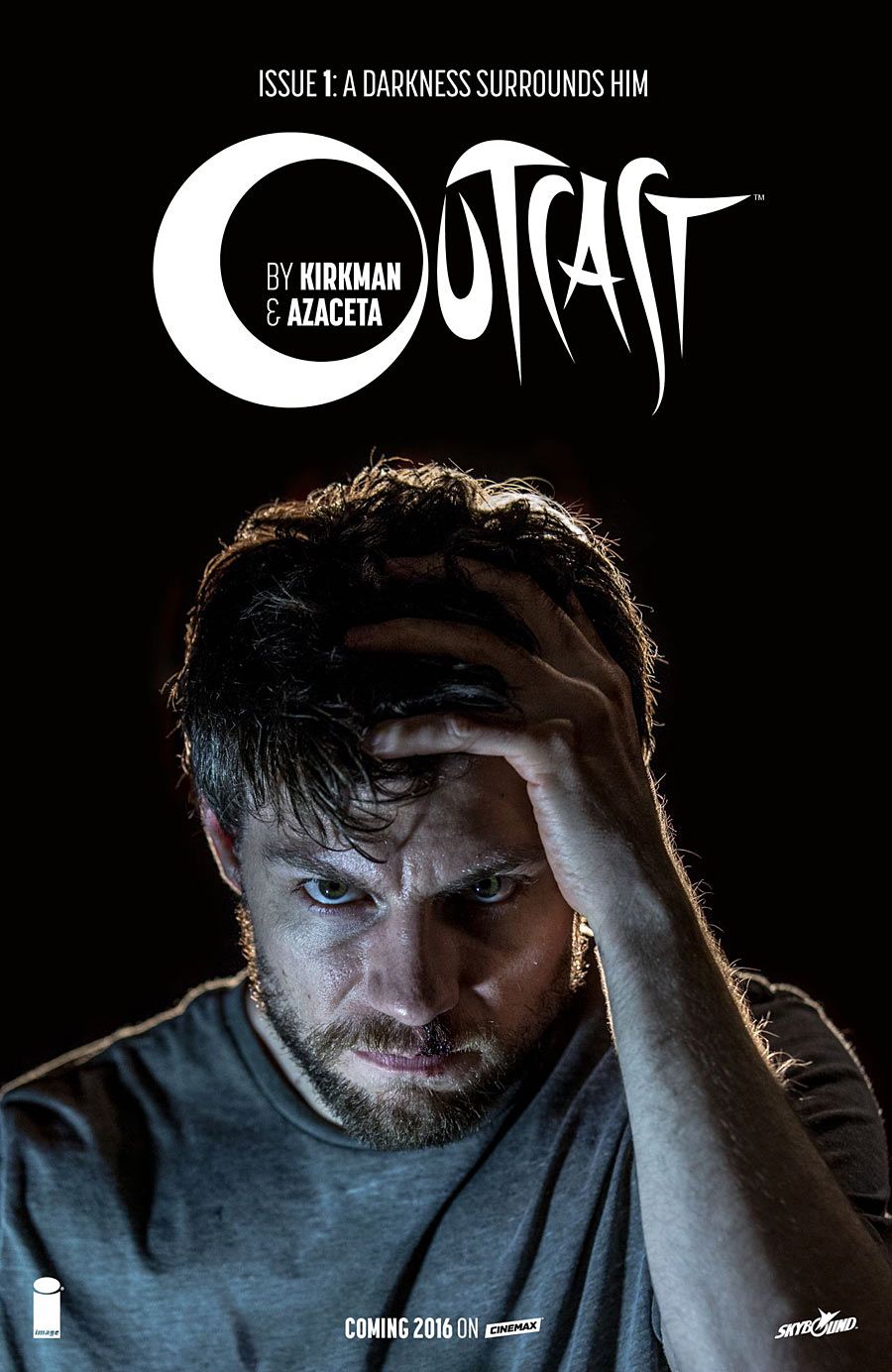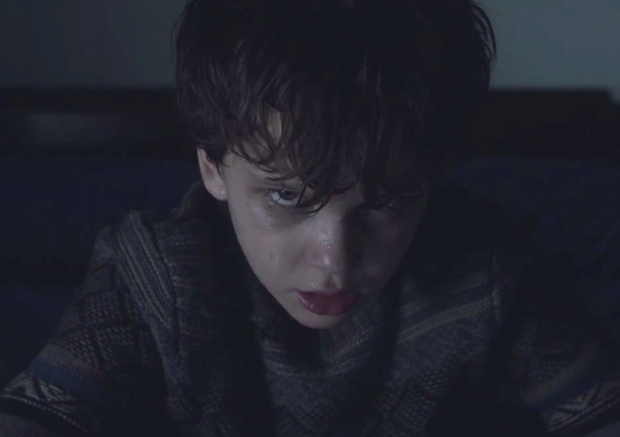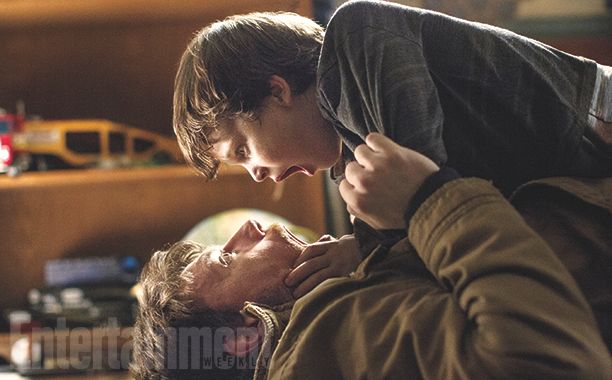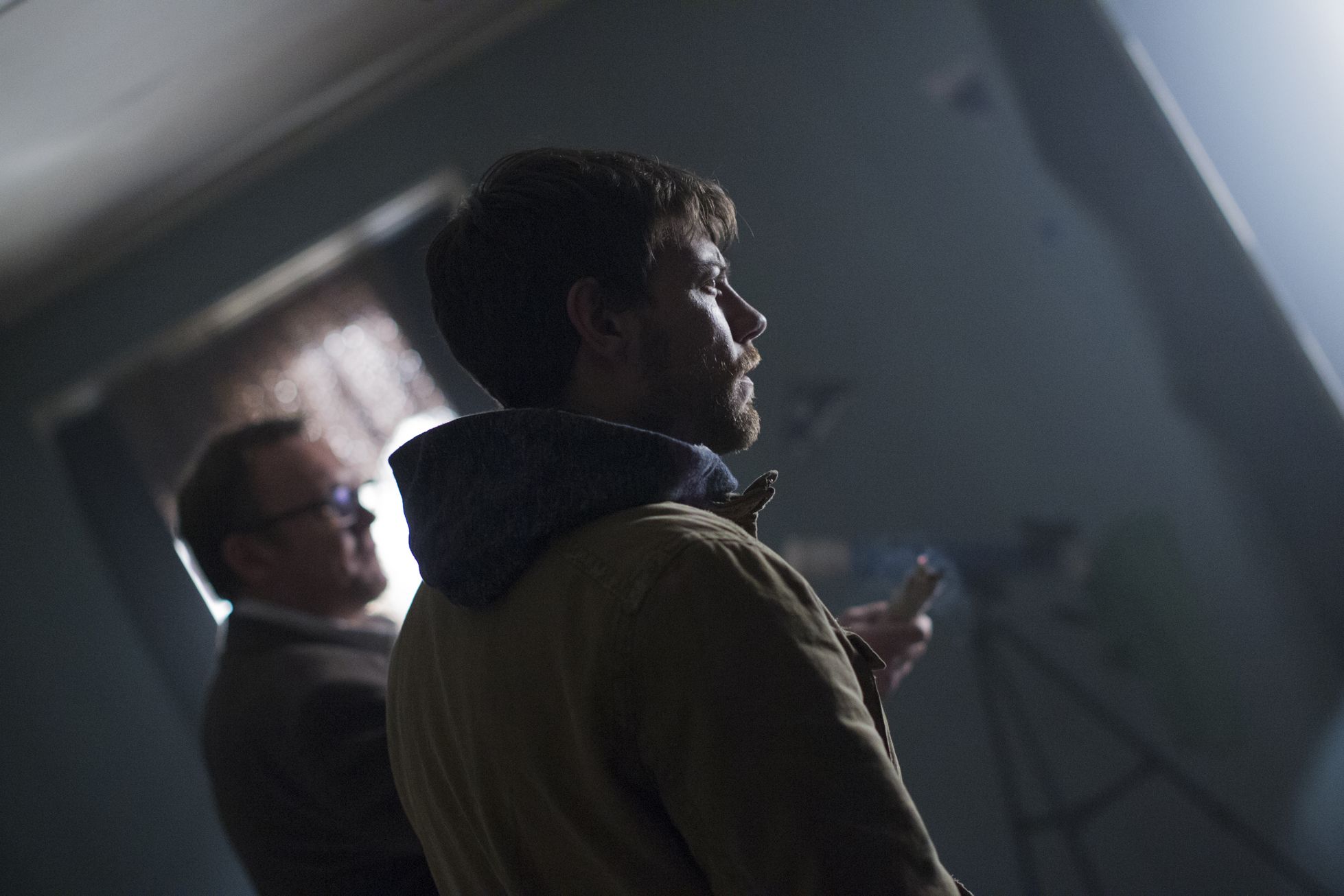At the age of 18, Patrick Fugit broke into film as the sweet-faced kid at the center of the Cameron Crowe showbiz drama "Almost Famous." Since then, audiences have seen him grow with more matureroles in the dark comedy "Wristcutters: A Love Story" and the deeply twisted thriller "Gone Girl." But this summer Fugit will take on his most demanding role yet in the new Cinemax series, "Outcast."
Based on the comics by Robert Kirkman and Paul Azaceta, "Outcast" finds Fugit playing Kyle Barnes, a bitter young man with a dark past who has a unique gift allowing him to communicate withthe demons that possess the locals of a rural small town. With the help of the righteous Reverend Anderson, Kyle aims to face hisdemons, and fight back against their dark intentions.
Co-Creator Robert Kirkman Calls "Outcast" Scarier Than "Walking Dead"
It's a disturbingtale that spooked the residents of the South Carolina towns where the series shot on location. "We had people put up signs up on garages on the street that said, '"Outcast" is going to bring the devil to South Carolina!'" Fugit recounted.
In a roundtable interview, CBR News sat down with Fugit and the pilot episode's director, Adam Wingard, best-known by horror fans for helming such frightening flicks as "You're Next" and "The Guest." Together, we dug intothe secrets of this daring series, from how it challenged Wingard, to Fugit's unique take on his character, and the secrets of working with the show'sscene-stealing "scary kid."
Robert Kirkman and Chris Black were talking about the casting of the series and said that you had some interesting stories about the audition process.
Patrick Fugit:As far as I know, we only met with one kid. I got the part, and then Phil Glenister got the part (of Reverend Anderson) and then they said they needed to cast Megan, who would eventually be Wren Schmidt. Then they were looking for this little boy. We came into the casting director's office one day and Gabriel (Bateman) comes walking in. He's small for a 10-year-old at the time. He's still pretty small, but he has an insanely large personality, and he's very clever. He comes into the room and basically just owns the room. He comes in. He introduces himself. He shakes everybody's hands -- [Mimes an exaggerated handshake]
Adam Wingard: He's got a big handshake, yeah!
It's like a whipping motion!
Fugit: Yeah! So his mom is like, "Cool, you do your thing," and she takes off. Then he just sits down in the chair. I can see him sizing me up.
Wingard: And he's not nervous at all, or at least he doesn't appear to be.
Fugit: No, he was ready to eat, or something like that.
Did he make you nervous?
Fugit: Yeah! So he sits down and Adam's like, "Okay, so, are you good? Do you have any questions?"
Wingard: Well, the way I'm talking to him, I thought I had to talk to him like he was a kid. I'm trying to break everything down in very simple terms, and he's beyond that. I was like, "Okay, you're going to go into scary mode right here." But he's not looking at it like, "Oh, I'm a scary kid." He's thinking about his motivation and stuff. He said something to that effect during the audition where he had this in-depth approach to it. We were all like "Uhhh... yes?"
Fugit: So Adam's like, "Do you have any questions?" and Gabriel is like, "Nope. I'm ready." So I'm like, alright, let's do a take. And the whole take is us coming in and talking to him, and he's possessed and going back and forth between this innocent 10-year-old and this demon. And we walk in, and he's so in it and so committed that I couldn't help but really just be in it with him. So we did the first take and I was like, "I don't see any other possibilities. This is the dude." I think I turned around and looked at Chris (Black, executive producer) and was like [mouths "Oh, my God"]. "Who is this guy?"
So we did it a few times, and Adam made some adjustments. What's really impressive is when young actors are malleable like that, when they can change and take direction. Because a lot of times, kids are coached so they memorize what to do, but not really why. Once Adam figured out he could direct Gabriel withwhyhe should do something and Gabriel could interpret that in his own way like an actor is supposed to be able to do, he could just run with it and bring his energy to it, which was high pitched.
Adam, for you, coming from a film world, what was the biggest change for you in terms of directing the pilot? Was there a big change for you in terms of story telling?
Wingard: There's definitely a different kind of time constraint. You're on a much more accelerated schedule than you are on a film. So that, in and of itself, was kind of scary for me. But the thing that was different for me is that when you're making a feature film you're making something that exists as a singular event -- unless you're setting up sequels and stuff. But a lot of the time that's like maybe if this movie goes well. So you're always kind of putting that in the back of your head. But with this, you know that you're trying to set up at least one season worth of episodes, which in this case was 10 episodes.
I was trying to make my decisions -- like picking locations and casting and designing the look and feel of it -- like, "Is this something that's duplicatable?" One of the biggest things that helped me out was working with someone like [cinematographer] David Tattersall. He also shot"The Walking Dead"pilot, but he's a veteran. He's shot so many movies, from"The Green Mile"to"Speed Racer"and everything in between, and he really helped me look at how to get through something like this by being smart about the way that you're picking your lenses and lighting it in a way where you can get a really dynamic look but it doesn't take a ton of time, because you just don't have a ton of time.
On the flip side of that coin, the network and everyone who's putting all of this money in still want it to look and feel like a motion picture and not like a network thing. So you have all of these pressures to make it look and feel like that. But you only have half the time to do it. You have to adapt to it. But once you get in the flow of it, it just starts happening.
When you're directing a pilot, you're setting the tone for an entire series. Is there a certain kind of pressure that comes with that as well?
Wingard: Fortunately for me, all I can do really is try to put what was on the page [on the screen]. And Robert [Kirkman] was a great guide in the sense that, he has a very distinctive idea of what the tone and everything was. I come from a more humorous horror background. A lot of the stuff I have has humor in it. And the horror that I've done in the past has a lot of jump scares and things of that nature.
There's actually a moment on the pilot where I was approaching a creepy scene where a character is sitting there. In the script, this possessed woman comes up to this little boy and is smelling him and grabs his hair and pulls him out of the chair. Whenever I was blocking it out, I thought it might be kind of cool to do as a jump scare version of this where it's the same thing, but instead of her kind of looming over him we creepily push in on the boy and a hand comes into frame and yanks him out. I was doing a couple of takes of that and was a good ways into it and Robert comes over and asks, "Um, what are you doing right now?" And I'm like, "Well, I'm doing this." And he's like, "Um, why don't you take another look at what's on the page and just shoot that." So I was like, "Well, we almost have this. How about I finish this off and I'll do that version?" He says, "Okay" and then he kind of reiterated that it's not a show about jump scares or the moment of violence. It's about the creeping dread of that violence. That was a big turning point for me, which luckily it was really the first scary scene we had done. We hadn't shot all the possession stuff yet, which came later. But that really made it all click for me. This isn't a show that's about that kind of scare. It's about the anticipation of the scare.
Patrick, when looking at the audition sides you got for Kyle, how did you choose to approach your character?
Fugit: One of the things that's always interesting to me about character stories is duality. For me, what's interesting about Kyle is, his story is dark and his circumstances are very dark, but I like to try to get across that Kyle's a very bright person and has a very bright heart. He has these circumstances that surround him in darkness, so that's what he succumbs to when we meet him in the first episode. Any character that appears one way but inwardly is something else is interesting to me. I wanted to get that across. I didn't want him too feel too dark or down or depressing or something like that.More simmering.
Is that at all a mercenary audition approach? Like, it might be hard to watch a character that is one-note dark. But the way you're talking about Kyle, it sounds like he has something that will make people want to keep with him. Is that something you think about?
Fugit: Yeah, absolutely. I feel like if a character is portrayed in one way and carries that momentum throughout, then whoever plays that has to be really, really good at that note. You know, there are actors who are really good at that one note. But most actors need more texture or variety to keep the audience interested. I always think that if there's more going on, or a motivation to the character that they don't get to express until they've discovered more about themselves or the world around them, then it makes it more compelling for me to watch. I feel more of a desire to root for them or keep going. Because if a character is sort of a sad sack or just a victim of the circumstances, then he's kind of annoying. So somebody who wants to be proactive or at least finds that capability within themselves to be proactive and not be subject to anything is more interesting than the other way around.
Did y'all have a scene or a sequence that you found particularly difficult to film?
Wingard: I was nervous because there's so much action with child actors. We've touched on that a little bit here, but there's some pretty extreme stuff that happens with Gabriel that involves him levitating and getting knocked around and all this stuff. So even beyond the fear of working with kids for the first time, and being able to direct them in a way that feels realistic, I had a lot of questions as to how we were going to achieve the physical aspect of it. Those fears immediately went away once we hired our stunt coordinator and team, because they had a great handle on it. Hiro [Koda], the stunt coordinator, has a great knack of finding the perfect stunt person for a kid. He'll find a full-grown adult that looks like a child from the right angle, and who can act believably in that kind of way. And he's able to coach the kids to do as much on-screen as possible, while keeping them safe the entire time. There was a lot of fears going into it, but once we got going, it was more a fear of if we could get all this and less about the technical ability of doing it.
Fugit: Any sequence where you have to express physical space and time can be difficult to storytell because if you're sitting there and watching it like it's a play or something, your mind can track what's going on. But as soon as you have to start telling the story and tell it for the audience then it become much more complicated. Like he's talking about but also form the actor's perspective there's a lot of things that have to happen with your emotional pitch, especially if you're looking at a sequence like what we filmed which took two and a half days.
Wingard: Well, it was sort of several possession scenes, spread out over the course of two and a half days.
Fugit: So two and a half days of pretty high-pitched physical exertion, and portraying emotion on top of that, and re-setting all the makeup and hair and getting fake-sweaty again, wiping blood off that may have happened. And then, going in and out of wire harnesses and stuff like that? It can be pretty exhausting. I think that going into that, I kept wondering how Gabriel was going to handle it, but the dude crushes everything, so he crushed that, too. He actually kept me going through a lot of it. I'd be like, "Ah, man. What's Wingard doing now? A shot from above!" But Gabriel is just 110% every take, all the time. High-pitched, he's biting me and hitting me and jumping on me. That sort of thing.
Can you guys talk a little bit about the research you did with possessions and what you came into this with?
Wingard: I was already familiar with real-life possessions and a whole lot of different possession movies."The Exorcist"is one of my favorite films. I sort of ironically, but not really, love"The Exorcist II"as well, for different reasons. So I was really familiar with the idea of that, but Robert's approach to it was that he created this entirely new mythology to the way we were approaching the exorcisms. What I thought was fun was that you are watching characters who are looking at it the same way, and playing by the rules that we know of it, and then they're kind of discovering that things are different and that this is the kind of thing that is a different reality than what we're dealing with here. And that was also what drew me to the project to begin with. I didn't want to do another Catholic exorcism movie or show. I want to tackle a lot of different sub-genres over the course of my career, and exorcism is just one of those that is kind of lingering out there. And if I'm going to do it, it's got to be something that's really new and different and attractive. And that's what this is, without giving too much away.
Before they send us off, do you have anything you want to tease about the show?
Wingard: Um, that's a good question. I don't know.
Patrick is just hiding his face. [He playfully, completely buries his face in his hands]
Wingard: [Laughs at Fugit] I think the pilot has a lot of surprises and mystery to it. That's what makes it such a fun series. It doesn't give you all the answers. I think it sets up the tone and feel and has a lot of great moments, but ultimately it leaves you wanting more, and I think that's what good TV does.
Fugit: Yeah. There's always parts of the story -- like superhero stories, or any kind of show that has a discovery period -- those are always really exciting to me. That's definitely what this first season involves. These characters are establishing the rules of this phenomenon and sort of seeking out answers, which leads to more questions. And things like that that I find really fun to watch.
"Outcast"debuts June 3 on Cinemax.

